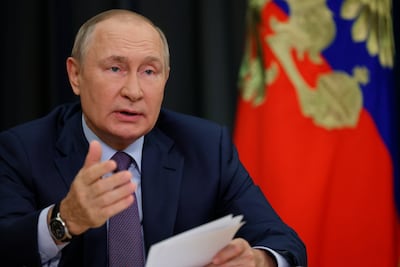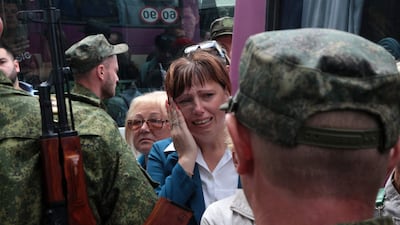Brussels is studying a new round of sanctions against Russia including a price cap on Russian crude oil and a ban on real estate purchases for Russians, EU diplomats told The National.
The European Commission has spent the past few days consulting with the EU’s 27 member states to discuss what sanctions should be applied in the wake of Russian President Vladimir Putin’s order of a partial mobilisation of his country’s armed forces to fight in Ukraine.
It is expected to announce later this week — or at the latest before the October 7 informal meeting of EU leaders in Prague — its seventh round of sanctions since Russia’s invasion of Ukraine in February.
The EU’s foreign policy chief Josep Borrell on Thursday said that “new restrictive measures, both personal and sectorial” would be issued and blasted Mr Putin’s hints at a nuclear response as an “irresponsible and cynical attempt to undermine our steadfast support to Ukraine”.
Baltic states, Ireland and Poland made a joint proposal to the Commission last week to issue sanctions that would include a ban on real estate sales to Russian citizens and companies unless they are EU residents, The Irish Times on Tuesday reported.
“We see the importance of extensive sanctions, especially after mass graves [were] found, continued Russian aggression and the announcement of mobilisation,” said an EU diplomat who confirmed the report.

The EU called for the establishment of an international tribunal for war crimes after the discovery of about 450 graves outside the formerly Russian-occupied city of Izium earlier this month.
Another European diplomat confirmed the joint proposal but said a new version was being drafted by the EU commission based on discussions held in the past days. It will be reviewed on Wednesday during a meeting of EU ambassadors.
'Property is a human right'
But some countries have balked at the idea of banning real estate purchases in Europe to Russians.
“The right to property is a human right,” said a third EU diplomat. “There are many sanctions ideas that have been floated that have not been implemented up to now and that’s because there were serious legal issues.”
The diplomat cast doubt on the effectiveness of further sanctions. “We’re arriving at the limit of what we can do – Europe has put nearly the entire Russian economy under sanction,” they told The National.
Yet, added the official, there is also a “momentum” for sanctions and “a desire to mark the occasion”.
The diplomat said that recent discussions had instead focused on a price cap on Russian oil that G7 finance ministers agreed to earlier this month.
“The idea would be to ban the transport and insurance of Russian oil over a certain price, meaning, in effect, a price cap” they said.
The EU will ban crude oil imports starting December and has reduced its gas imports from 40 per cent to less than 9 per cent since February.
Europe remains the biggest market for Russian crude despite a 53 per cent drop in imports since January, according to the International Energy Agency.
Another topic of discussion among diplomats in Brussels is a ban on an import of Russian diamonds, which represent roughly a third of world production.
The US Treasury in April sanctioned Alrosa, the world’s largest diamond mining company, which is owned by the Russian state.
Transparency International on Monday called for additional EU sanctions on the company and its CEO Sergei Ivanov.
But Belgium, which houses a major world diamond hub in the city of Antwerp, has reportedly lobbied against such a ban.
Belgian and Indian buyers are snapping up large volumes of Alrosa diamonds often at lucrative terms, Bloomberg reported earlier this month.
Sanctioning symbolic trades like diamonds remains important, said the third EU diplomat.
“But let’s not forget that sanctions are not a means to an end,” he added.
“They’re an instrument that are part of a wider policy, including diplomatic pressure and sometimes military intervention.”


